Reply To:
Name - Reply Comment
Last Updated : 2024-04-19 22:36:00
A right violated or a right sacrificed?
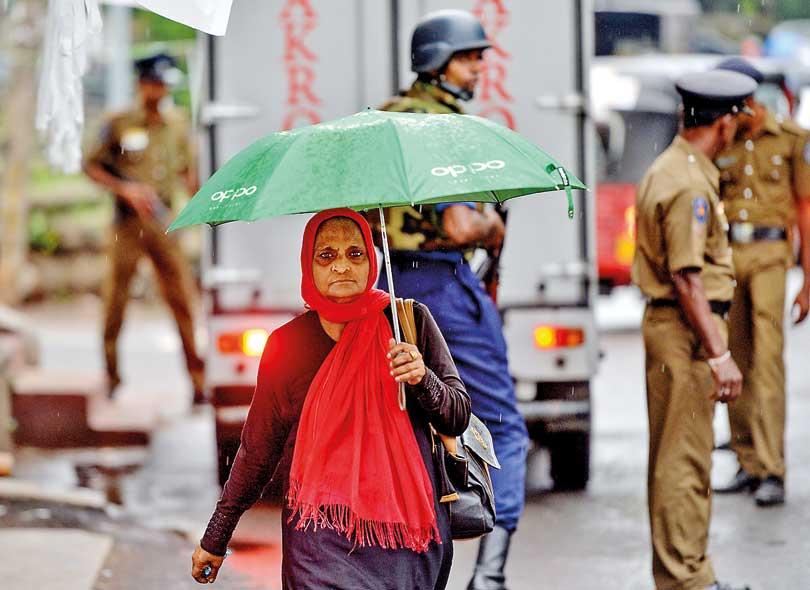
A Sri Lankan Muslim woman walks past a military checkpoint in Colombo( AFP)
 It was almost a decade ago that countries across Europe began wrestling with the issue of the Muslim veil – in its various forms. The debate encapsulated religious freedom, female equality, secular traditions and even fears of terrorism. The conversation explored the multiculturalism in Europe, as many argued that there needed to be a greater effort to assimilate ethnic and religious minorities.
It was almost a decade ago that countries across Europe began wrestling with the issue of the Muslim veil – in its various forms. The debate encapsulated religious freedom, female equality, secular traditions and even fears of terrorism. The conversation explored the multiculturalism in Europe, as many argued that there needed to be a greater effort to assimilate ethnic and religious minorities.
Owing to the recent terror attacks, multi-ethnic Sri Lanka has also now entered this topic of heated discussion.
A gazette notification was issued amending the Emergency Regulations to include the ban on garments covering the face that came into effect on 29th April 2019.
Section 5 of the Public Security Ordinance (Chapter 40) says “No person shall wear in any public place any garment, clothing or such other material concealing the full face which will in any manner cause any hindrance to the identification of a person.”
“Full face” means the whole face of a person including the ears.
Several Muslim Councils, including the country’s top body of Islamic scholars, the All Ceylon Jamiyyathul Ulama (ACJU) have backed the move on security grounds. They consider obliging to the ban as a patriotic necessity to a country that has allowed them religious liberty so far.
There’s no mention of covering the face and eyes or niqab or trailing around in long enveloping things. It’s clear that there has been a lot of misinterpretation of the Holy Quran
founder Sri Lanka Muslim Women’s Conference (SLMWC), Deshabandu Jezima Ismail
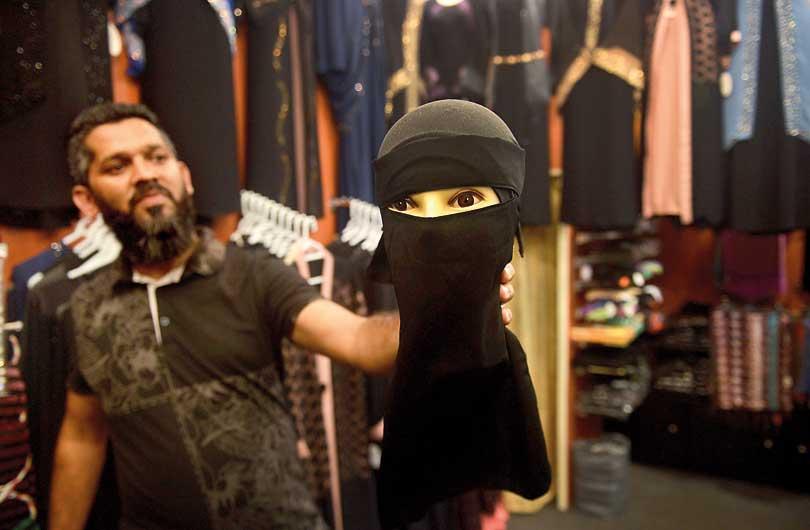
A Sri Lankan vendor shows a full face veil, called a niqab, at a shop selling clothes for Muslim women in Colombo(AFP)
Chairperson of the Human Rights Commission Sri Lanka (HRCSL) Dr Deepika Udagama shared that, “At the moment, the banning of full face coverage, which include the burqa, the niqab and full-face helmets, is about security concerns. For the HRC, the security situation is about public safety and nothing else. So at a time like this, I think the public needs to cooperate.”
Aligning with her opinion, Educationist and Founder of the Sri Lanka Muslim Women’s Conference (SLMWC), Deshabandu Jezima Ismail also viewed the ban as a positive move.
“I know many are of the opinion that one should have the right to wear what one pleases and chooses, but I feel that it is a duty to wear something that is convenient for others and doesn’t interfere with their safety and security. We have been talking about this for a long time, but no action was taken, I hope this time it will be successful,” she shared.
Desperate to rebuild an image tarnished by terrorists, act on behalf of their own women and respond to the national demands, after discussing with the Higher Authorities concerned, the ACJU released a set of guidelines for Muslim women to follow.
These guidelines request women who are covering themselves to remain indoors and for those with an extreme need to go out to refrain from full face coverage. It stresses however that the head scarf and abaya must still be worn, as covering their ‘awra’ is given great importance.
Ash-Sheikh Fazil Farook, the ACJU media secretary expressed that these actions were taken in response to people misinterpreting the Muslim clothing as something of a terrorist movement, and that at this disturbing injunction it was only a necessary measure.
“Of course a woman being modest and religious is of key importance, but under circumstances, Islam gives certain guidelines. In a situation where the Muslim community has been framed as a terror group, we need to clarify ourselves, allow the National Security System to do their investigations and not have our religious practices be a barricade to them,” he said.
However, the issue has also evoked retaliation against the power of the All Ceylon Jamiyyathul Ulama (ACJU) over the Muslim community. In this regard, Human Rights activist and founder of Women’s Action Network, Shreena Saroor was vehement.
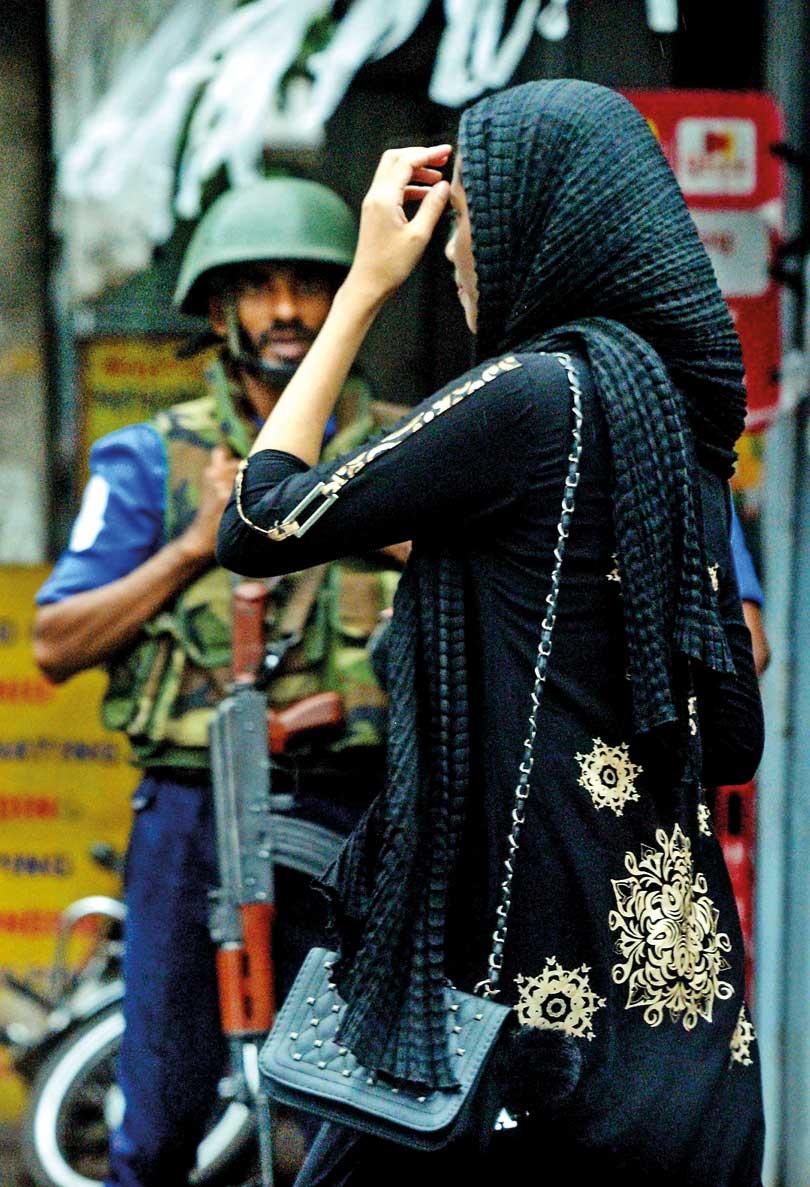
A Sri Lankan Muslim woman gestures as she walks along a road in Colombo on April 30, 2019. - (AFP)
“Who do these men think they are, to decide what we women wear? It was the ACJU that told us to cover our faces in the first place, what right do they have to tell us when and when not to wear the burqa?” she expressed.
She described how the ACJU’s response to the crisis, has further dilated ethnic differences. “We Muslims, through Muslim politicians, ethnicization and ACJU’s religious fundamentalism have been made exclusive and ‘other’ in this country. And taking away Muslim women’s rights has been a major part of it. They (the ACJU) have a responsibility to correct this mess, but not by controlling us Muslim women.”
Saroor was adamant that the president should have discussed this issue with the Muslim women that it really affects, instead of consulting the ACJU; an all male-body that has made the decisions in their place. While the ban itself was not opposed by her, she revealed the means through which it was executed as sexist and outrageous.
“Extremism starts with controlling a woman’s body, and ACJU has been doing that for so long…If the president is talking about extremism, he should not be talking to religious people who are isolating the Sri Lankan Muslims as ‘the other’. Starting from attire, to what to eat, where to live, how to celebrate festivals and how to sit and stand, they have been dictating terms to us. We as Sri Lankans should abide by Sri Lankan law. We want to live together amicably with other communities and are ready to abide by this country’s laws,” she shared.
The controversy aroused by the niqab and burqa is nothing new. There are those who consider face coverage as a form of worship and religious choice, as protection against the lustful eye of men and women alike and/or as means of respect and status.
There are also those who see it as a symbol of oppression, patriarchy and alienation mostly due to the inequality it accommodates, especially regarding opportunities.
It is clear that the ban offends some parties, who protest that their right to manifest their religion or belief has been stripped. The contrary opinion that such rights are subject to obligations when public order is at stake also persists.
Jezima Ismail stated that, “this has nothing to do with religion. It is a custom. Whatever the case, if you want to continue living in this country, in a safe environment, some of these things we must let go. I firmly believe in the fact that we are first Sri Lankan citizens.”
It is evident that Islam holds an expectation of modesty and speaks of covering certain body parts, but this is very contextual.
As Jezima said, “There’s no mention of covering the face and eyes or niqab or trailing around in long enveloping things. It’s clear that there has been a lot of misinterpretation of the Holy Quran.”
If people insist on religion be made part of the conversation, she suggested that they embrace the Islamic principle of being at peace with yourself and those around you and cease to stand in the way of national peace.
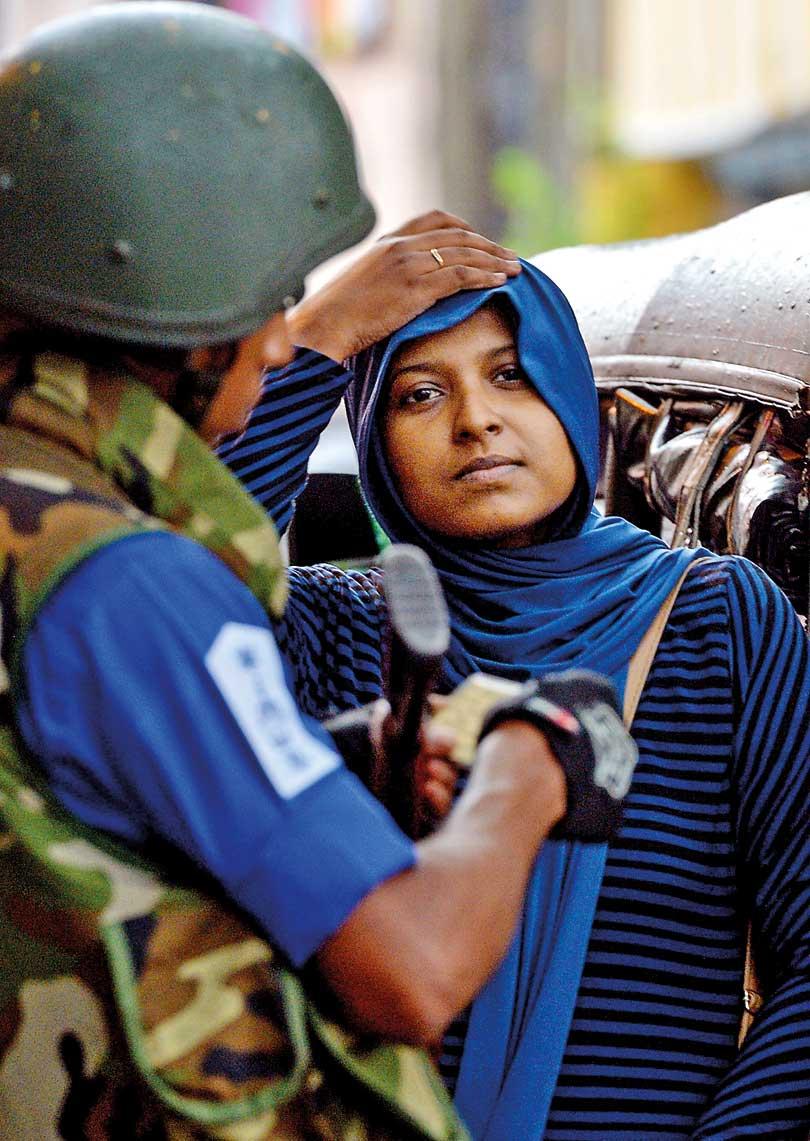
A Sri Lankan Muslim woman looks on at a checkpoint in Colombo on April 30, 2019. - ( AFP)
However, a security threat isn’t the only allegation against burqas and niqabs. Some perceive them as backward and barriers to progression, particularly since this isn’t a case of rigid tradition being passed through centuries.
“We were not covered when we were born. These burqas are a recent thing… Look back to the Muslim community twenty years ago. Did our mothers wear burqas, abayas or anything of the sort? They simply covered their heads with the head scarf when they went out. Does that mean all our ancestors end up in hell? No. This is all an ACJU created mess,” Shreen Saroor pointed out.
She argued that it is not the violation of religion, but the violation of women that must be focused on here. “Women produce people and we know how to protect them. Whether it has to do with national security or not, Muslim women have the right to take their own decisions. And these men are using religion as a device to take that right away from us.”
Dr. Udagama too contradicted the notion of it being a religious violation.
Who do these men think they are, to decide what we women wear? It was the ACJU that told us to cover our faces in the first place, what right do they have to tell us when and when not to wear the burqa
founder of Women’s Action Network, Shreena Saroor
“The right to follow a religion is unrestricted, but religious practice comes with restriction,” she said.
While under normal circumstances, this issue deals with cultural and religious practices and human rights, it is clear in this scenario covering one’s face will be obtrusive and insensitive.
She added that, “There appears to be a robust debate at present within the Sri Lankan Muslim community on whether the niqab (and burqa) is an unquestionable religious mandate or a cultural requirement that was introduced into the country more recently. However in a free society, such debates and discussions do not necessarily have to begin with forceful impositions by the State. There are instances where we find women who say it is their choice to wear the niqab/burqa, which again shows us that such decisions are best left in the hands of the Muslim women themselves.”
Defending the ACJU’s decisions, Fazil Farook stated, “No this is not a violation. The same religion that says a woman must cover, gives room to adapt to these situations.”
It is undeniable however that along with certain international human rights organizations, a considerable portion of citizens do find offence in the ban. And some find the risk of confrontation, the discrimination at work places and the associated misjudgment as causes to resist relenting to popular opinion. Being a small minority, they will succumb to obligation temporarily, but will not necessarily agree with the misinterpretations associated with the face veils and be subdued in the long run.
“Everybody has a right to their own dress codes,” stated N.M Ameen, the President of the Sri Lanka Muslim Council, who perceived the ban as a violation despite momentary acceptance.
Will A Permanent Ban be Supported?
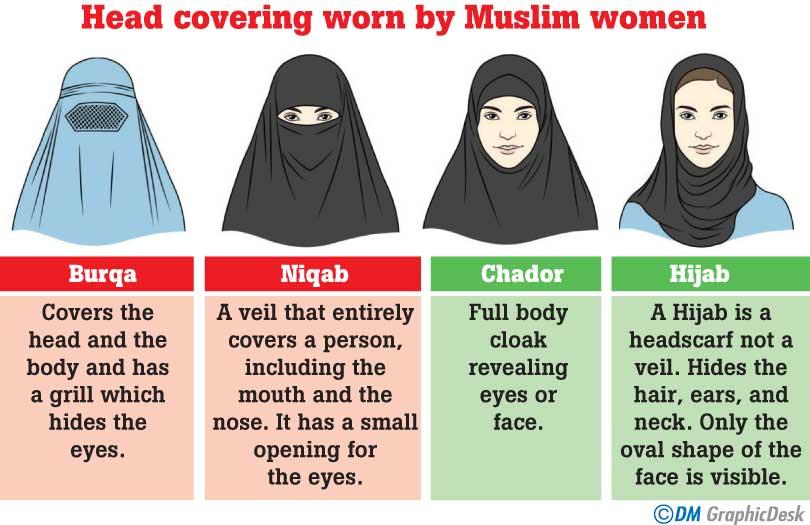
Dr. Udagama believed that this decision was not just anyone’s to make. “While the state has a right to ban cultural practices like genital mutilation of women that blatantly violate human rights, the matter of a permanent ban should ideally come from within the community. If the state tried to play the role of the cultural regulator, they are entering difficult territory,” she expressed.
The Sri Lanka Muslim Council (SLMC) and the ACJU stand against a permanent ban, but intend to comply with the temporary restrictions for as long as the emergency requires it.
According to Farook, “all the suicide bombers never had this dress on them. There is only a suspicion that this is going to happen. In accordance with that and the obstacles to security identification, we have released these guidelines until the crisis clears.”
For some others, the permanence of this ban signifies a forward movement toward a unified society.
Several Muslim Councils and the All Ceylon Jamiyyathul Ulama (ACJU) have backed the move on security grounds
If the ban were to be made permanent, they believe it would solve issues instead of causing further separation. They are of the view that life in a pluralistic society is one that demands adaptation and equal fulfillment of one’s neighbours’ interests as well one’s own.
The niqab or burqa may very well be a Muslim woman’s right, her form of worship, her personal sense of modesty and/or her desired countermeasure against societal evil, but if this right is endangering an entire nation’s fragile hold on peace and risking the escape of terrorists who extirpated hundreds of innocents, then it is by all means worthy of sacrifice, is it not?
Having obligatorily foregone their rights in the face of necessity however, does not in any way quell their fight to retain their desired forms of expression. This tragedy has instead created a space for new conversations and greater possibilities to be explored in the future in this regard.

Roland Phillips Thursday, 02 May 2019 12:48 PM
This was not a practice in the good old days. We mixed with Muslim Men and Women, attended their functions. It is these extremist groups that are causing all the problems.
Arnold Friday, 03 May 2019 08:05 AM
Things do not stay the same for ever. When Muslim women started covering more, other women started uncovering more. A decade ago we did not see so many belly buttons on the road, hotels, hospitals, airports and even in funeral services.
Ultimate Friday, 03 May 2019 12:05 PM
Just to keep all of you guys informed, in the good old days you hardly in fact never found any muslim women outdoors. Even if there was a necessity to go out, the bullock carts have curtains inside them to cover the small windows. If you dont know this, then you better go check the history. i am speaking about the majority and not the 0.01% of the women like the ones who have commented for this article who hardly have any knowledge of Islam though muslims i believe. Secondly, let alone ACJU, the Quran clearly says there is no compulsion in islam. you either take it or leave it. not sure why so much of anger in that case against ACJU. even Islam has never forced you, dont blame it on ACJU. Like any other religion, the Archbishop or the mahanayakes are the epitome of the community, you hardly find anyone going against them. But you always find plentiful jokers always against ACJU. one of those were these National Thowheed Jamaath and the lady commentators in this article. Tx, Zuha
sanatan arya Thursday, 02 May 2019 01:51 PM
so called religion of peace
Muslim Thursday, 02 May 2019 07:53 PM
What ever the case may be - please get away from wearing black - it is disgusting
No more walking tents Friday, 03 May 2019 02:42 AM
A few years ago, the claim the Muslims appear to be radicalising was met with a "Oh, Sri Lankan Muslims aren't like that". Well, they have proved us wrong. Ban this ridiculous thing before a veiled woman kills us. When this happens everyone will suffer, most of all, Muslim women themselves.
Andrew Silva Friday, 03 May 2019 05:41 AM
Times have changed ladyes,we are sorry if any one is hurt. But a new dawn has dawned it is so refreshing to see your innocent and beautiful faces. You are free.
ziad Friday, 03 May 2019 08:02 AM
Modest dress is what is prescribed. Following and importing dresses representing other cultures should be shunned and if necessary banned for all, men and women of all communities, for the authorities to remove board and deflect accusations of partisanship.
aruna Friday, 03 May 2019 08:56 AM
Why can't they go to Saudi Arabia and practice Sharia Law , Be-headings, Nikab etc., without making Sri Lanka a Saudi province.
Ali Friday, 03 May 2019 09:40 AM
Would say it is much less than 1% here in Sri Lanka who covet the face or only the eyes to be open I guess.
Lalith Friday, 03 May 2019 10:15 AM
Too little. Too late. Country's security is more important than somebody's religious belief. It was never Sri Lankan culture. If you live in this country live like a Sri Lankan, not like an Arab.
Dhammika Guneratne Friday, 03 May 2019 10:52 AM
If this dress is NOT an islamic dress code WHY ONLY muslim (followers of islam) wear it ? .
Sammy Friday, 03 May 2019 10:58 AM
For security reasons it is important to ban face covers
P P Hifellarachchi Friday, 03 May 2019 10:59 AM
the diffrent view points from various groups specifically the women's groups show that though they say that there is freedom and respect for women in Islam it isn't. every thing is decided by a group of men who think what is good for others. specially for women. that is why they can have four women but they say it is the merciful peaceful religen and given by the God. read the slogan "there is no god but Allah " and under it a sword and the sword is a warning for others so peaceful.
Tuan Friday, 03 May 2019 02:23 PM
Wel to all ....I am also a muslim but i am totally again those women covering their faces, how do we come to know who is this person men or a woman....thief or terrorist. covering ur entile body is OK. NOT THEIR FACE. In the middle East countries its ok majorities are muslims and they have their own vehicles.....In our country its not the same some women travel in the public transport service such as busses and trains...its really funny and fearful to others wearing full black like ninja
ram Thursday, 09 May 2019 08:26 AM
as per human right, why we are forced to wear cloths with some conditions like not to show few parts of the body. isn't not my right to wear what i want. why police insist by law to wear helmet, seat belt. is it not my choice. we born as naked and why go back with completely covering.

Add comment
Comments will be edited (grammar, spelling and slang) and authorized at the discretion of Daily Mirror online. The website also has the right not to publish selected comments.
Reply To:
Name - Reply Comment
On March 26, a couple arriving from Thailand was arrested with 88 live animal
According to villagers from Naula-Moragolla out of 105 families 80 can afford
Is the situation in Sri Lanka so grim that locals harbour hope that they coul
A recent post on social media revealed that three purple-faced langurs near t